Communities of color are doing unpaid work to fix the state’s broken vaccine system
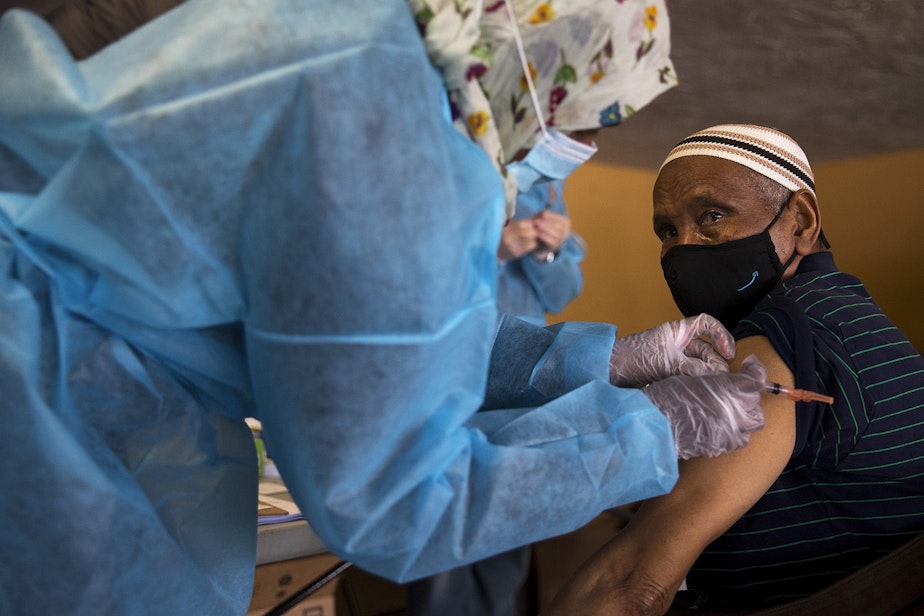
Washington state knew its primary vaccination tool, Phase Finder, would exclude some communities.
In a folding chair in a basement parking garage, Jebbeh Freeman let out a wistful sigh. “I’m so happy,” she said. “I’m so excited.”
She got a note on her front door to stop by this impromptu vaccine clinic for her first dose that day. It’s run by Othello Station Pharmacy, the Somali Health Board and the Brighton Apartments, where Freeman lives, to bring doses directly to immigrant and refugee communities shut out from accessing vaccines because of language, tech, and information barriers.
Community groups serving immigrants and people of color are stepping into the gaps created by what they see as government getting equity wrong.
In particular, a vaccine rollout that is not reaching the arms of people most impacted by Covid-19. The grassroots organizations are doing unpaid public health work navigating the state’s confusing vaccine eligibility system for elders, and in at least one case, becoming an official vaccine provider and injecting people themselves.
“We need to do a better job in terms of accessibility, because we know, and we are hearing from across the state, that language and other access barriers continue to be a challenge,” said Paj Nandi, Director of Community Relations and Equity at the Washington State Department of Health.
The department is working to address those challenges moving forward, he said, for example through translating communications materials in 36 languages and making interpreters available for vaccine appointments made by phone.
But the burden to navigate vaccine eligibility and appointments is falling on community organizations.
Minh-Đức Nguyen heads the organization Helping Link-Một Dấu Nối, which provides English, citizenship and iPad classes.
These days the majority of her time is fielding calls from people seeking vaccines for Vietnamese elders, she said. When she doesn’t have the information, she looks it up.
“People need an answer, and at least I don’t want to give them the run-around,” Nguyen said.
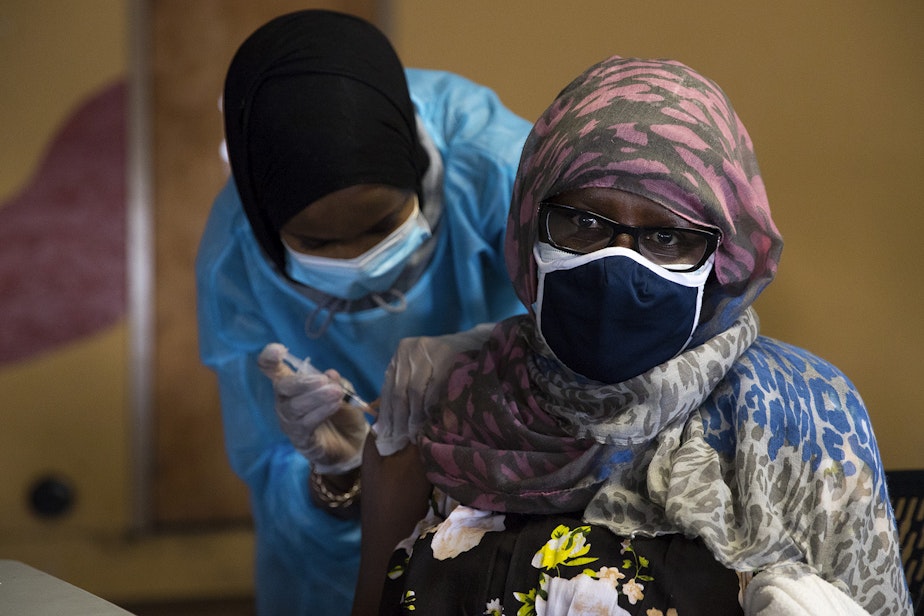
At the pop-up vaccine clinic, Jebbeh Freeman said she came to the U.S. as a refugee from Liberia in 2003. She says reading and writing English is hard. She has a smartphone phone but doesn’t really know how to use the Internet.
“My children, when they come to be with me, they say ‘When you want to do this, you go here.’ They’re the ones that teach me,” Freeman said. “But now – you know, America – when they get big, they go away from you, so you have to be by yourself.”
Freeman was able to get that Moderna dose because pharmacist and Somali Health Board director, Dr. Ahmed Ali was able to jump through the hoops to sign the pharmacy up as an official vaccine provider with the state.
“Not everybody is in the same boat, and that’s what we need to start to look at,” Ali said. “If we’re to address disparities, how do we do that? What’s practical and what’s just conversation?”
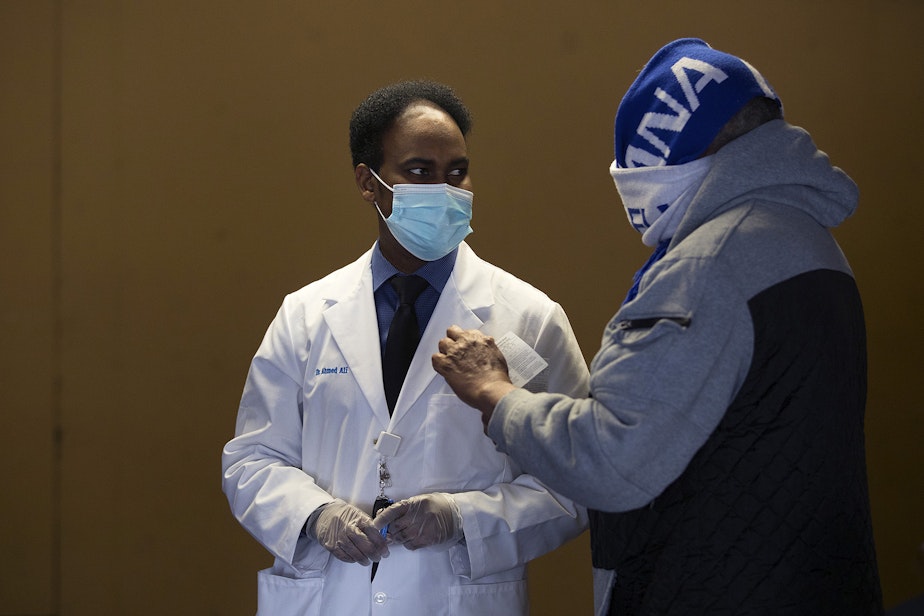
The Asian Counseling and Referral Service is another place older adults and their families are turning for help.
That’s a “major strain” on staff time, executive director Michael Byun said. Staff have built trusted relationships with community members, who naturally reach out when they need help. The organization is not being compensated for this extra work, though.
“We just have to do this regardless of whether the resources are available,” Byun said. “That is because we are seen by the community as an important source of support and help.”
Though some extra money or support would be “very helpful,” he said. State and county public health departments should support community-based organizations with resources, Ali of the Somali Health Board said, for example to run pop-up vaccination clinics.
“It takes more than just a clinic; it takes more than a provider to do that. It takes individuals who know who's who, and who's able to come to these vaccination sites,” he said.
A new vaccination site opened on the Microsoft campus in Redmond February 10 with an emphasis on serving older adults in communities hardest hit by the pandemic.
Asian Counseling and Referral Service is one of four community organizations reaching out to people who are eligible for vaccinations and helping them schedule appointments.
The organizations are not compensated for that work, according to Public Health – Seattle & King County.
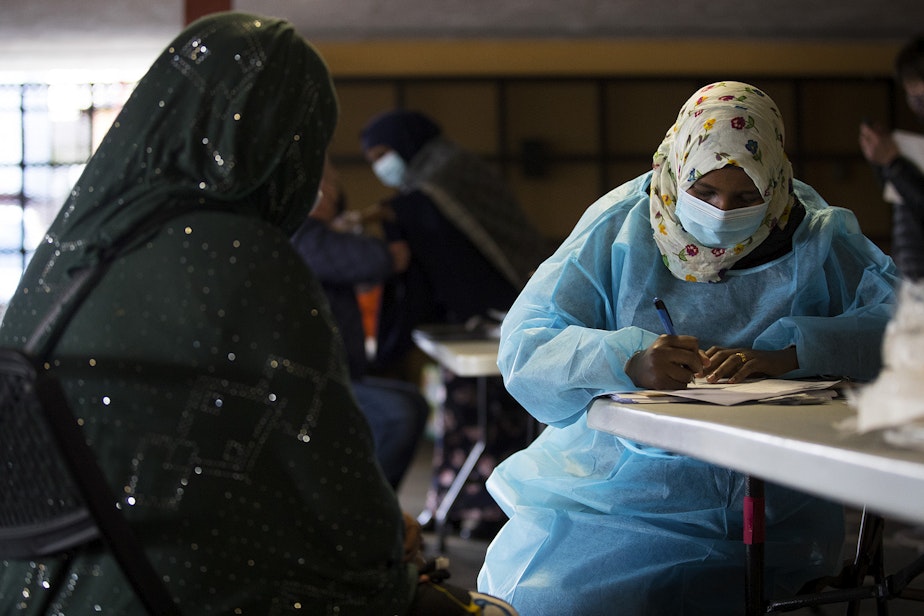
State’s main tool is a barrier
KUOW interviewed leaders of a dozen groups who serve immigrants and people of color. Many cited problems with Phase Finder, the state’s web application for determining vaccine eligibility and routing priority people to doses. The tool has a lot of assumptions baked in – from the assumption that you would know how to access a website in English or Spanish, to the assumption that you have a printer or know how to take a screenshot.
The state health department plans to expand the number of languages available on Phase Finder in mid-February, around a month after the application launched. Nguyen from Helping Link rolls her eyes when she talks about Phase Finder and calls it “useless.”
“If you don’t give people the right tools, it’s just like if they don’t have access to the eggs and the flour to make the cake, they’re not going to be able to make it,” she said. “People just assume that you have eggs and flour in your house, but not everyone.”
The Department of Health says you can also prove your eligibility and make a vaccine appointment over the phone through the state’s Covid-19 Assistance Hotline: 1-800-525-0127, then press #.
Vaccination data show inequities
So far, data on vaccinations statewide show vaccines are reaching seniors at disproportionately low rates – including white people – according to a report from the state department of health.
For all age groups getting one dose of vaccine, the biggest disparities are among Latinos (4.7% of first doses compared to 13.2% of the state population); Black people (2.2% of first doses compared to 3.9% of the state’s population), and multiracial people (0.2% of first doses compared to 4.3% of the state’s population.
The data do not include race or ethnicity for 11% of people.
White people, Asian people and Pacific Islanders have received a vaccine dose at roughly proportionate rates, according to the data.
In King County – 20% of American Indian or Alaska Native residents and more than 13% of white residents have received a vaccine dose, compared to more than 11% of Asian residents, over 9% of Pacific Islanders, over 7% of Black residents, and close to 6 percent of Latino residents, according to data from Public Health – Seattle & King County.
“I think it is very disappointing. For sure,” said Nandi, who directs equity for the state health department.
He cited a range of contributing factors, from barriers to access to distrust of the health care system, vaccine hesitancy and the state’s demographics of eligible people.
The state is still early in the vaccination program, Nandi said.
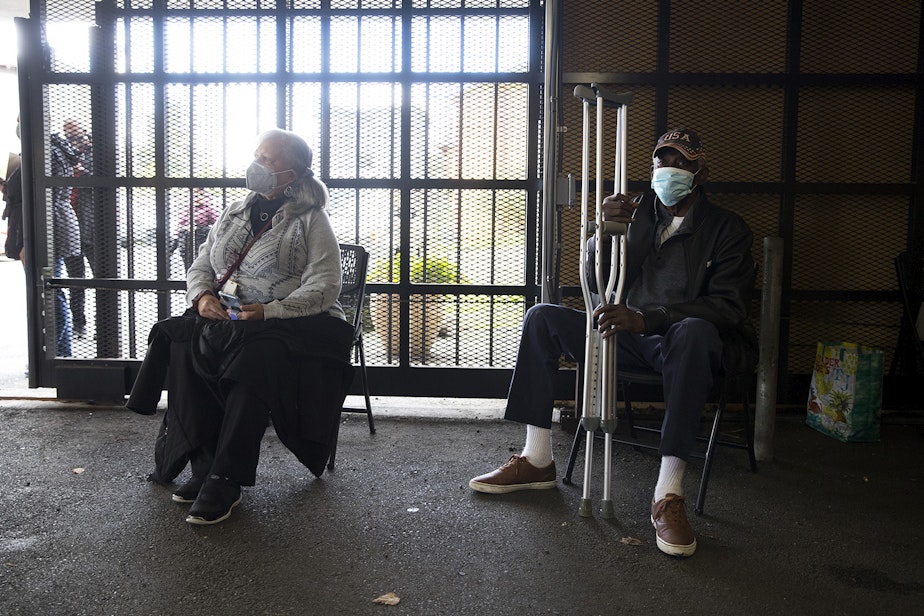
“I think now is the time for us to continue to listen to community, and course correct, and add new activities and strategies where we can truly make an impact on equity and not just talk about it in lofty term,” he said.
Angie Hinojos, executive director of Redmond-based Centro Cultural Mexicano, called the disparities in the data a huge problem.
“We are being told that there is education and outreach to the Latino community, but we haven’t been seeing it and these numbers show otherwise,” she said.
Leaders of many organizations told KUOW public health authorities have not provided enough information in the right languages or formats about the vaccines.
Some groups say that means getting away from messages spread mainly through the Internet or social media and may even include dropping off fliers at commonly visited stores, or houses of worship, or directly at the doorstep of people eligible for vaccines.
“It starts with educating our community and saying, ‘Here are your options. And here's what we know, and you can make an informed decision,'” Hinojos said. “And then after that process, how do we make it the easiest way possible to access these vaccines?”
The state health department says it contracts with 14 community organizations to do Covid vaccine outreach, along with media outlets that serve a range of communities.
In October the department of health conducted interviews and focus groups with hundreds of people, and this month the department convened the first meeting of a “Collaborative” group around vaccine outreach and implementation in communities most affected by the pandemic.
“How much of that is actually decision-making?” said Jiquanda Nelson a member of the African American Health Board, and former equity, inclusion and diversity director with Kaiser Permanente in Washington.
“You can bring these people to the table, but they ultimately cannot hold these leaders and these employees accountable, because it's a voluntary space,” she said.
Instead, the results of the vaccine rollout so far make it clear the state did not include the most impacted people in key decision-making, she said.
“I wouldn't say ‘at the table for decision-making’ but we've had a partnership collaborative the entire time, you know, regular updates and regular streams of input with our different provider organizations,” said Michelle Roberts, who heads the state health department’s Covid-19 vaccine planning.
Phase Finder was never intended to be a “one-stop shot shop” for everyone to get a vaccine, Roberts said.
“That is the primary place, but we always knew it was not going to meet every community's needs,” she said.
Instead, Roberts said, that’s why the state is looking to engage with communities in other ways and get vaccines out to many different places as possible – from pharmacies and mobile vaccination clinics to “Latinx day” at the state’s mass vaccination site in Wenatchee.
While the state insists equity has been considered from the beginning of vaccine planning, that’s not how it seems to some community leaders.
“They don’t do it with compassion,” Minh-Đức Nguyen from Helping Link said. “It’s like an afterthought.”

